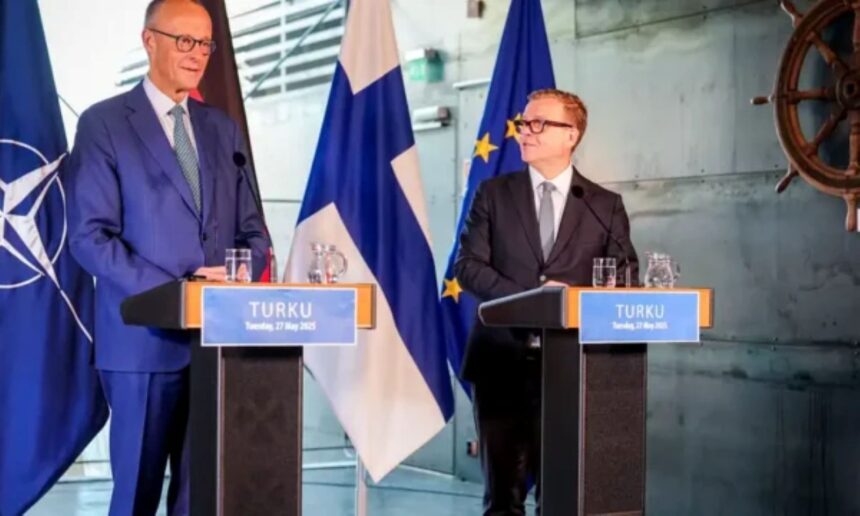For Chancellor Friedrich Merz, the message is clear: Germany and other countries must be prepared to support Ukraine for the long haul. His recent trip to Finland appears to have brought a shift, at least in rhetoric.
At the Forum Marinum maritime museum in Turku, surrounded by torpedoes and old naval ships, Merz addressed the central issue: security in and around the Baltic Sea and the situation in Ukraine. At this point, Merz seemed both clear and resigned: he no longer believes in a quick peace solution.
Efforts to influence Russian President Putin over the past three weeks have yielded no results. The fact that Russia is unwilling to accept Vatican mediation shows Moscow has no interest in a ceasefire, Merz said at a Tuesday (May 27) press conference with Finnish Prime Minister Petteri Orpo. Merz went further, stating that wars usually end with military or economic exhaustion of one or both sides, but “that point is still far away.”
For Merz, the consequence is that European support for Ukraine must be intensified, especially given the unclear role the US under Trump plays regarding sanctions and aid to Ukraine.
While Merz did not specify exact plans, he is expected to discuss details on Wednesday (May 28) with Ukrainian President Zelenskiy, who will visit Berlin. Merz and German President Steinmeier will host him. According to Spiegel magazine, a new support package for Ukraine is set to be announced.
New Tone in Relations with Russia
In Finland, Merz reiterated that there should be no restrictions on the range of weapons systems supplied. This practically does not affect German deliveries, as most lack the range to reach Russian territory. France and the UK have long had no distance restrictions on their cruise missiles.
Merz has notably shifted from the cautious rhetoric of his predecessor Olaf Scholz, who only agreed to limited use of weapons in the Kharkiv region. Merz aims to be verbally more aggressive toward Russian President Putin, especially since Northern European countries have made clear the consequences of hybrid attacks.
Nordic Countries Expect Support
Although his visit lasted less than 24 hours, Merz managed to get a comprehensive overview of security in Scandinavia.
At a joint dinner in Turku Castle and in private talks, Nordic leaders detailed Russia’s daily provocative actions: in the Baltic Sea, illegal Russian fleet oil tankers damage underwater cables; in the air, Russian fighter jets repeatedly violate Finnish airspace; and along the 1,300 km Russia-Finland border, satellite images show increased Russian military activity.
The Nordic countries feel threatened by Russia and expect support from Germany. Finnish Prime Minister Petteri Orpo, from the same political family as Merz, praised the Chancellor for demonstrating Germany’s willingness to fulfill its responsibilities as a major EU country.
“We Must Defend Together”
However, what this means in practical military terms for NATO partners in the Baltic region remains unclear. For example, it is uncertain if Germany plans to expand its naval deployments to monitor the Baltic Sea.
Merz highlighted discussions about the illegal Russian fleet, referencing the EU’s 17th sanctions package targeting this “shadow fleet.” According to Merz, Russia uses damaged oil tanker ships to maintain oil trade and finance the war against Ukraine.
For Merz, this is not just about Russia’s aggression against Ukraine. Russia is “threatening the entire region and the political order,” so “we must defend ourselves together,” he said.
The trip to Finland marks at least a rhetorical shift in Merz’s approach toward Russia.







